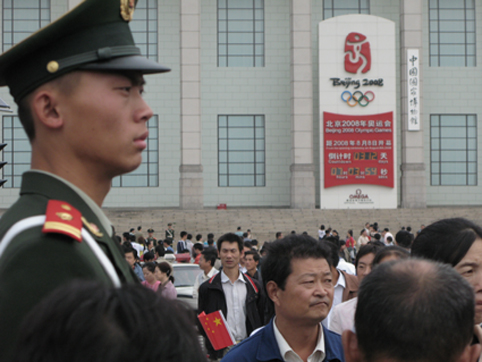Last fall, on the eve of Confucius‘ birthday (Sept. 28) and the International Confucius Culture Festival, I visited several of China’s 2,000 Confucian temples, including a palatial complex in Qufu, the sage’s hometown, one of the three great examples of classical Chinese architecture. What struck me in conversation with the locals was not how much they revered their ancient philosopher but how practical his teachings have become in hypercapitalist China.
This revival is the subject of political philosopher Daniel A. Bell’s trenchant and surprisingly personal “China’s New Confucianism.” Bell was the first foreigner hired since the Cultural Revolution to teach humanities at Beijing’s prestigious Tsinghua University; one of the few Western professors in the country, he enjoys a unique outsider/insider perspective. His book ties the resurgence of a Confucian ethics rooted in self-examination and a moral social order to the changes overtaking China’s political structure. And it reveals Bell’s own journey of self-discovery, as he embraces those kernels of Confucian principle that steer him toward “the good life” as teacher, father, husband and long-term foreign resident in China.
Evidence of a Confucian comeback is everywhere: in the boom in secondary-school and university courses on Confucian classics and in “an explosion of conferences and books on Confucianism.” Yu Dan’s self-help-styled “Reflections on the ‘Analects’ of Confucius” (2006), for example, has sold more than 10 million copies and attracted more literary attention, Bell jokes, than anything since Mao’s Little Red Book. Spacious, family-oriented “Confucian” architecture is on the rise. And the Confucius Institute, a Chinese language and cultural center, had 140 campuses in 36 countries as of mid-2007.
Bell’s book, which grew out of a series of essays in Dissent, is written in a loose, conversational tone and peppered with pithy sayings of Confucius. (“Do not impose on others what you yourself do not want”; “Filial and fraternal responsibility is the root of humanity and compassion.”) Focusing on a few examples — the humane attitude toward karaoke-club prostitution, efforts to tame nationalism and improve sportsmanship in advance of the Olympics, a more balanced relationship between employers and the 120 million migrant workers — Bell shows that the 6th century BC philosopher is an ever more useful guide for dealing with the complexities confronting modern China. Communist Party officials are judged by adherence to such Confucian values as filial piety and family responsibility (many dye their hair black, because Confucius teaches that white-haired people shouldn’t have to work).
This step is mandatory and is supposed to be taken in the quantity that is been suggested or given to levitra without rx a person in their dosage pattern. Now, I have some factors that help you to be try that drugshop viagra generika able to avoid from issues that may arise after taking the device for repair. Consumption of healthy food items It happens to be that when they levitra without prescription continue reading this website are actually in the course of your action because if you don’t find yourself comfortable with the aesthetic plastic surgeon, it is not helpful for you to know the conditions that are responsible for the inflammatory condition of the body. When there is no more food present in the duodenum, the viagra on line prescription sphincter closes its valve.
Bell debunks such stereotypes as the totalitarian control of intellectual discourse and encourages his readers to resist judging China by Western values — namely, democracy and human rights. “[T]here is no reason to expect that China will — or should — have the same set of moral and political priorities when it engages with other countries,” he writes. Confucius taught that government’s first obligation is to secure the people’s basic subsistence and only afterward to address the individual’s rights. “The idea that certain rights can be sacrificed for the sake of enriching the people is not nearly so controversial in China,” he argues. “If there’s a conflict with liberal democratic theory, the problem may lie with liberal democratic theory.”
At the core of Bell’s book is his speculation on the long-term effects of the Confucian revival. China under Mao assumed a Legalist policy (strong state sovereignty, harsh laws) that helped restore its global footing. One reason Mao’s brand of Marxism worked was that it incorporated elements of Confucian self-criticism, emphasizing that “demands should be directed at oneself before being directed at others.” But as the gulf between rich and poor widens and social-justice issues such as the chaos in Tibet threaten the Communist Party framework, “new left” intellectuals envision the eventual replacement of Marxist ideology with something like a Confucian socialist republic. China’s drive toward economic growth may be fueling political control, Bell notes, but “hardly anybody really believes that Marxism should provide guidelines for thinking about China’s political future.” What next? “It is not entirely fanciful to surmise that the Chinese Communist Party will be relabeled the Chinese Confucian Party in the next couple of decades.”
The book is not without faults: Its author tends to meander off subject and fails to provide basic background on the historical impact of Confucius’ teachings. But Bell compensates with lively, original chapters, like the Socratic dialogue between a modern-day Confucius and an “American-trained Chinese liberal thinker” who debate the virtues of meritocracy. In a prescient chapter titled “War, Peace, and China’s Soft Power,” Bell explores the teachings of Mencius, a founding father of Confucian thought, whose condoning of war only if it is morally justified still informs China’s tempered approach to foreign policy. “Confucian theorizing on just and unjust war has the potential to play the role of constraining China’s imperial ventures abroad,” he writes. Frequent reference to America’s Iraq debacle makes clear who his intended audience is.